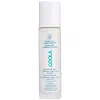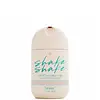What's inside
What's inside
 Key Ingredients
Key Ingredients

 Benefits
Benefits

 Concerns
Concerns

 Ingredients Side-by-side
Ingredients Side-by-side

Water
Skin ConditioningZinc Oxide
Cosmetic ColorantCaprylic/Capric Triglyceride
MaskingPolyhydroxystearic Acid
EmulsifyingDimethicone
EmollientAloe Barbadensis Leaf Juice Powder
Skin ConditioningButylene Glycol
HumectantCaprylyl Glycol
EmollientCetearyl Alcohol
EmollientDidecyldimonium Chloride
EmulsifyingGlyceryl Caprylate
EmollientGlyceryl Stearate Citrate
EmollientHydroxyethyl Acrylate/Sodium Acryloyldimethyl Taurate Copolymer
Emulsion StabilisingJasminum Sambac Leaf Cell Extract
MaskingMethylpropanediol
SolventNiacinamide
SmoothingPEG-7 Trimethylolpropane Coconut Ether
EmulsifyingPolyisobutene
Polyquaternium-80
CleansingPropanediol
SolventSchinus Molle Extract
Skin ProtectingSorbitan Isostearate
EmulsifyingTheobroma Cacao Seed Extract
AntioxidantWater, Zinc Oxide, Caprylic/Capric Triglyceride, Polyhydroxystearic Acid, Dimethicone, Aloe Barbadensis Leaf Juice Powder, Butylene Glycol, Caprylyl Glycol, Cetearyl Alcohol, Didecyldimonium Chloride, Glyceryl Caprylate, Glyceryl Stearate Citrate, Hydroxyethyl Acrylate/Sodium Acryloyldimethyl Taurate Copolymer, Jasminum Sambac Leaf Cell Extract, Methylpropanediol, Niacinamide, PEG-7 Trimethylolpropane Coconut Ether, Polyisobutene, Polyquaternium-80, Propanediol, Schinus Molle Extract, Sorbitan Isostearate, Theobroma Cacao Seed Extract
Zinc Oxide 20.5%
Cosmetic ColorantAloe Barbadensis Leaf Juice
Skin ConditioningButyloctyl Salicylate
Skin ConditioningButyrospermum Parkii Oil
EmollientC12-15 Alkyl Benzoate
AntimicrobialCamellia Sinensis Leaf Extract
AntimicrobialCaprylhydroxamic Acid
Caprylic/Capric Triglyceride
MaskingCarbomer
Emulsion StabilisingCeramide AP
Skin ConditioningCeramide EOP
Skin ConditioningCeramide NP
Skin ConditioningCholesterol
EmollientCucumis Sativus Fruit Extract
EmollientDihydromyrcene
PerfumingDiisostearoyl Polyglyceryl-3 Dimer Dilinoleate
EmollientDimethicone
EmollientEthylhexyl Methoxycrylene
Skin ConditioningEthylhexyl Olivate
Skin ConditioningEthylhexylglycerin
Skin ConditioningFerulic Acid
AntimicrobialMelozone
PerfumingGlycerin
HumectantGossypium Herbaceum Seed Oil
Skin ConditioningHexyl Cinnamal
PerfumingHyaluronic Acid
HumectantIsododecane
EmollientMagnesium Sulfate
Methyl Octine Carbonate
PerfumingNiacinamide
SmoothingPassiflora Edulis Seed Oil
EmollientPhenoxyethanol
PreservativePhytosphingosine
Skin ConditioningPolyglyceryl-3 Oleate
EmulsifyingPolyglyceryl-4 Diisostearate/Polyhydroxystearate/Sebacate
EmulsifyingPolyglyceryl-4 Isostearate
EmulsifyingPolyhydroxystearic Acid
EmulsifyingScentenal
PerfumingSodium Benzoate
MaskingSodium Gluconate
Skin ConditioningSodium Lauroyl Lactylate
EmulsifyingSqualane
EmollientSr-Hydrozoan Polypeptide-1
HumectantTocopherol
AntioxidantTriethoxycaprylylsilane
Undecane
EmollientWater
Skin ConditioningXanthan Gum
EmulsifyingZinc Oxide 20.5%, Aloe Barbadensis Leaf Juice, Butyloctyl Salicylate, Butyrospermum Parkii Oil, C12-15 Alkyl Benzoate, Camellia Sinensis Leaf Extract, Caprylhydroxamic Acid, Caprylic/Capric Triglyceride, Carbomer, Ceramide AP, Ceramide EOP, Ceramide NP, Cholesterol, Cucumis Sativus Fruit Extract, Dihydromyrcene, Diisostearoyl Polyglyceryl-3 Dimer Dilinoleate, Dimethicone, Ethylhexyl Methoxycrylene, Ethylhexyl Olivate, Ethylhexylglycerin, Ferulic Acid, Melozone, Glycerin, Gossypium Herbaceum Seed Oil, Hexyl Cinnamal, Hyaluronic Acid, Isododecane, Magnesium Sulfate, Methyl Octine Carbonate, Niacinamide, Passiflora Edulis Seed Oil, Phenoxyethanol, Phytosphingosine, Polyglyceryl-3 Oleate, Polyglyceryl-4 Diisostearate/Polyhydroxystearate/Sebacate, Polyglyceryl-4 Isostearate, Polyhydroxystearic Acid, Scentenal, Sodium Benzoate, Sodium Gluconate, Sodium Lauroyl Lactylate, Squalane, Sr-Hydrozoan Polypeptide-1, Tocopherol, Triethoxycaprylylsilane, Undecane, Water, Xanthan Gum
 Reviews
Reviews

Ingredients Explained
These ingredients are found in both products.
Ingredients higher up in an ingredient list are typically present in a larger amount.
This ingredient is an emollient, solvent, and texture enhancer. It is considered a skin-softener by helping the skin prevent moisture loss.
It helps thicken a product's formula and makes it easier to spread by dissolving clumping compounds.
Caprylic Triglyceride is made by combining glycerin with coconut oil, forming a clear liquid.
While there is an assumption Caprylic Triglyceride can clog pores due to it being derived from coconut oil, there is no research supporting this.
Learn more about Caprylic/Capric TriglycerideDimethicone is a type of synthetic silicone created from natural materials such as quartz.
What it does:
Dimethicone comes in different viscosities:
Depending on the viscosity, dimethicone has different properties.
Ingredients lists don't always show which type is used, so we recommend reaching out to the brand if you have questions about the viscosity.
This ingredient is unlikely to cause irritation because it does not get absorbed into skin. However, people with silicone allergies should be careful about using this ingredient.
Note: Dimethicone may contribute to pilling. This is because it is not oil or water soluble, so pilling may occur when layered with products. When mixed with heavy oils in a formula, the outcome is also quite greasy.
Learn more about DimethiconeNiacinamide is a multitasking form of vitamin B3 that strengthens the skin barrier, reduces pores and dark spots, regulates oil, and improves signs of aging.
And the best part? It's gentle and well-tolerated by most skin types, including sensitive and reactive skin.
You might have heard of "niacin flush", or the reddening of skin that causes itchiness. Niacinamide has not been found to cause this.
In very rare cases, some individuals may not be able to tolerate niacinamide at all or experience an allergic reaction to it.
If you are experiencing flaking, irritation, and dryness with this ingredient, be sure to double check all your products as this ingredient can be found in all categories of skincare.
When incorporating niacinamide into your routine, look out for concentration amounts. Typically, 5% niacinamide provides benefits such as fading dark spots. However, if you have sensitive skin, it is better to begin with a smaller concentration.
When you apply niacinamide to your skin, your body converts it into nicotinamide adenine dinucleotide (NAD). NAD is an essential coenzyme that is already found in your cells as "fuel" and powers countless biological processes.
In your skin, NAD helps repair cell damage, produce new healthy cells, support collagen production, strengthen the skin barrier, and fight environmental stressors (like UV and pollution).
Our natural NAD levels start to decline with age, leading to slower skin repair, visible aging, and a weaker skin barrier. By providing your skin niacinamide, you're recharging your skin's NAD levels. This leads to stronger, healthier, and younger looking skin.
Another name for vitamin B3 is nicotinamide. This vitamin is water-soluble and our bodies don't store it. We obtain Vitamin B3 from either food or skincare. Meat, fish, wheat, yeast, and leafy greens contain vitamin B3.
The type of niacinamide used in skincare is synthetically created.
Learn more about NiacinamidePolyhydroxystearic Acid is a soft wax made from castor oil.
It is is a texture thickener, emulsifier, and film-former. Emulsifiers prevent ingredients from separating, such as oils and waters.
Polyhydroxystearic Acid may not be fungal acne safe.
Learn more about Polyhydroxystearic AcidWater. It's the most common cosmetic ingredient of all. You'll usually see it at the top of ingredient lists, meaning that it makes up the largest part of the product.
So why is it so popular? Water most often acts as a solvent - this means that it helps dissolve other ingredients into the formulation.
You'll also recognize water as that liquid we all need to stay alive. If you see this, drink a glass of water. Stay hydrated!
Learn more about WaterZinc Oxide is a mineral broad-spectrum UV filter; it is the broadest UVA and UVB reflector approved by the FDA. It also has skin protectant and skin soothing properties.
Zinc oxide is one of the most effective broad-spectrum UV filters. It protects against UVB, UVAII, and UVAI. In comparison to its counterpart titanium dioxide, zinc oxide provides uniform and extended UVA protection.
Another great benefit? This ingredient is highly photostable so it won't degrade easily under sunlight.
A common myth is that mineral UV filters are widely believed to primarily reflect UV light.
However, modern research shows titanium dioxide absorbs UV radiation like chemical filters (~95% absorption & 5% reflection).
Zinc oxide has great skin soothing properties so you'll likely find this in sunscreens formulated for sensitive skin or babies/children. It is unlikely to cause "eye sting" like other sunscreen ingredients.
Regulatory agencies consider zinc oxide to be non-toxic and safe. It has also been shown to not penetrate the skin.
Unfortunately, this ingredient does leave a visible white cast. This is why mineral sunscreens are often less cosmetically elegant than chemical or hybrid ones.
In cosmetics, zinc oxide can be found in both non-nano and nano-sized forms. The nano version is used to reduce white cast and improve the texture of sunscreen formulas.
There are ongoing concerns surrounding nano-zinc oxide's impact on marine ecosystems and whether it can be absorbed into skin.
Regarding marine ecosystems and coral reefs, there is no conclusive evidence that any form of zinc oxide (or any other sunscreen ingredients) will cause harm. The science is still developing but many consumers are keeping a close eye on this issue.
Please note, many destinations have reef-safety sunscreen rules. For instance, the U.S. Virgin Islands advises all visitors to use non-nano mineral sunscreens.
There has also been some stir about whether micronized or nano zinc oxide has potential photoxicity and absorption through the skin/lungs.
An in-vitro (done in a test tube or petri dish) study demonstrated micronized zinc oxide to have potential phototoxicity. There's no need to fret; the EU Commission's Scientific Committee on Consumer Safety has stated, "The relevance of these findings needs to be clarified by appropriate investigations in vivo." Or in other words, further studies done on living organisms are needed to prove this.
Current research shows zinc oxide nanoparticles do not penetrate intact or sunburned skin. They either remain on the surface or in the outermost layer of dead skin (stratum corneum).
Zinc oxide is one of only two classified mineral UV filters with titanium dioxide being the other one.
Fun fact: Zinc has been used throughout history as an ingredient in paint and medicine. An Indian text from 500BC is believed to list zinc oxide as a salve for open wound. The Ancient Greek physician Dioscorides has also mentioned the use of zinc as an ointment in 1AD.
Learn more about Zinc Oxide